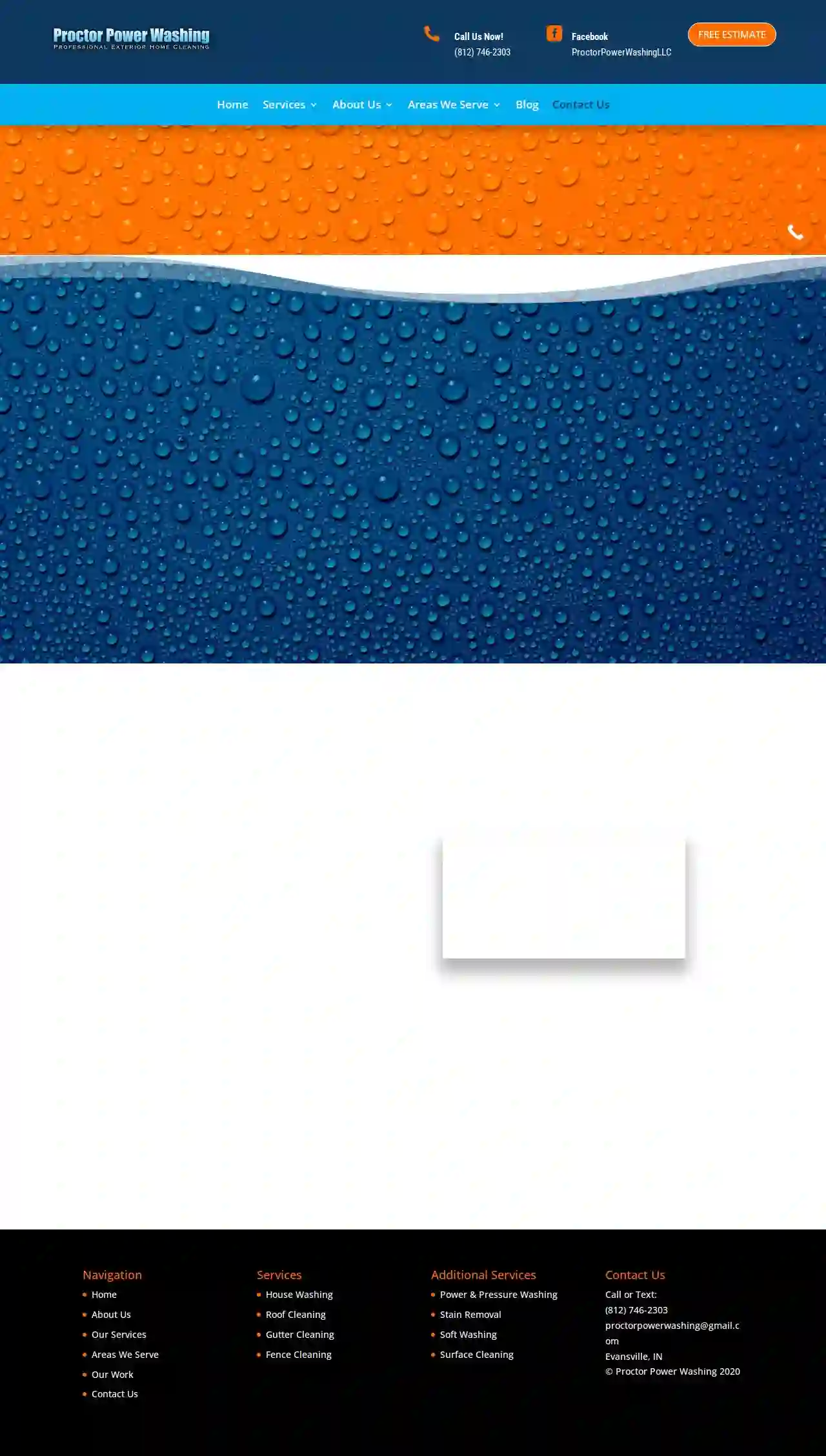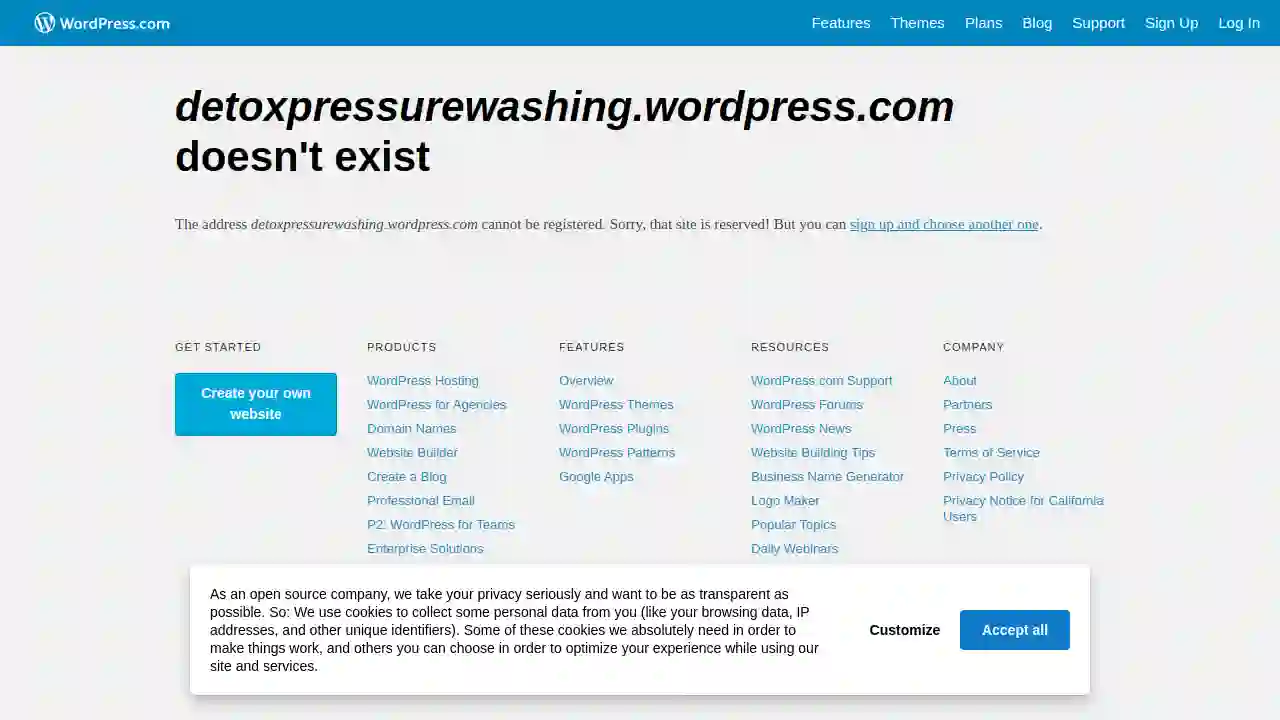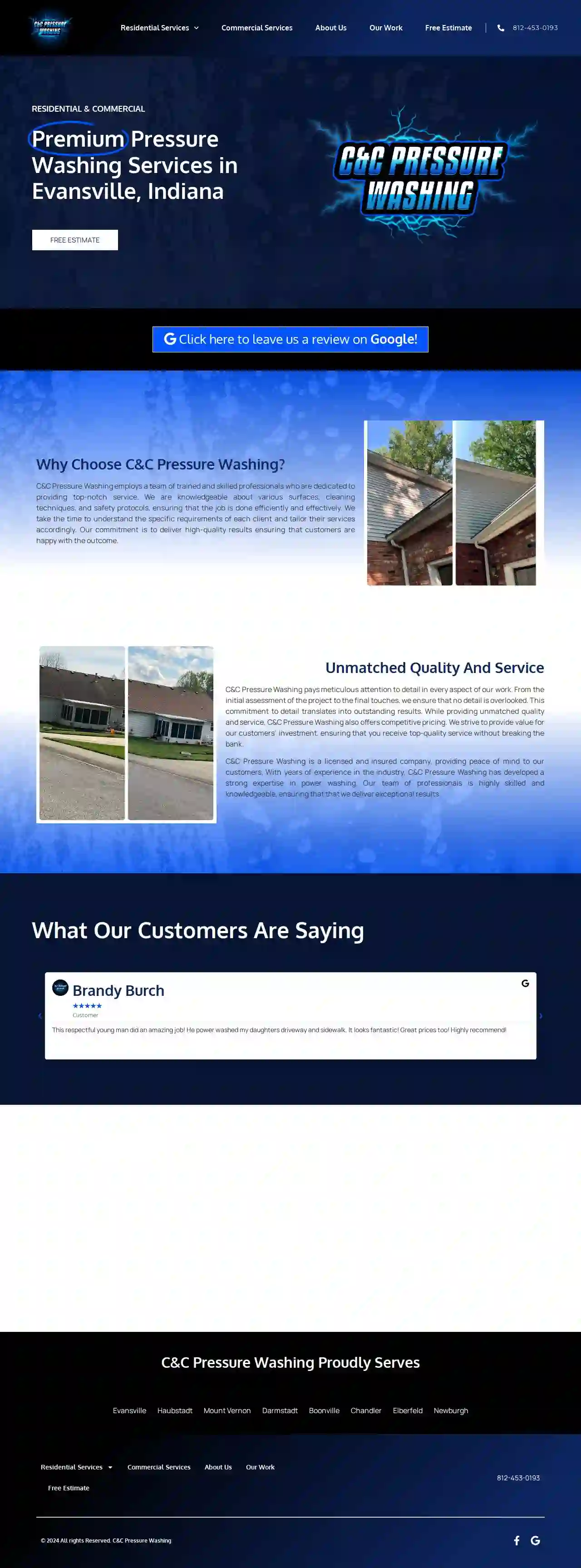Pressure Washing Mishawaka
Top Pressure Washing in Mishawaka
Receive multiple Driveway Cleaning quotes for your project today! Compare profiles, reviews, accreditations, portfolio, etc... and choose the best service.

Fresher With Pressure
532 reviewsEvansville, USWe are a professional exterior cleaning company focused on helping home owners and business owners maintain the value of their properties in the Evansville, Indiana area.
- Services
- Why Us?
- Gallery
Get Quote
Ishineprrssurewash.com
2730 Wayside Drive, Evansville, 47711, USiSHINE Pressure Washing is a locally owned and operated pressure washing contractor servicing Southern Indiana and Western Kentucky. We offer a full line of pressure washing including house washing, roof cleaning, pressure washing, and driveway cleaning. We have built a reputation as a premier exterior cleaning service in Indiana due to our pursuit for perfection and the dedication of our amazing staff.
- Services
- Why Us?
- Accreditations
- Our Team
- Testimonials
- Gallery
Get Quote
Pressure Doctor Inc. Power Washing & Holiday Lighting
4.9159 reviews123 Main St, Suite 100, Indianapolis, 46201, USPressure Doctor Inc. Power Washing & Holiday Lighting is a top-rated pressure washing service in Indianapolis, Indiana. They specialize in revitalizing properties with their expert pressure washing services, removing grime, stains, and dirt to restore the pristine appearance of homes and businesses. Their services include commercial pressure washing, specialty cleaning, drone cleaning, gutter cleaning, concrete cleaning, concrete sealing, and holiday lighting. Pressure Doctor Inc. aims to deliver the highest quality service, using professional equipment and cutting-edge cleaning solutions. Their team is experienced and dedicated to providing top-notch services to ensure customer satisfaction.
- Services
- Why Us?
- Accreditations
- Our Team
- Testimonials
- Gallery
Get Quote
Mike's Power Wash
525 reviews1111 N Delaware St, Indianapolis, 46204, USMike's Power Wash is a family-owned soft washing company with over six years of experience serving the greater Indianapolis area. No job is too big or too small for our team of cleaning professionals. We do all the dirty work, so you don't have to. We use a soft washing technique that's just as effective as pressure washing but doesn't harm materials and structures. This low-pressure method removes bacteria, mold, mildew, dirt, contaminants, and pollutants from surfaces without causing damage.
- Services
- Why Us?
- Gallery
Get Quote
Dream Team Exterior Solutions - Pressure Washing & Property Maintenance
4.958 reviewsIndianapolis, USDream Team Exterior Solutions is a full-service company in Indianapolis, Indiana, dedicated to meeting your various outdoor and indoor needs. We offer a range of services designed to alleviate the hassles, inconveniences, and grime that accumulate over time due to factors like lack of time, changing seasons, and weather conditions. Our mission is to help you maintain the beauty and functionality of your home or business by providing high-quality, reliable solutions for all your exterior and interior maintenance needs. Whether you need a thorough pressure washing, sparkling clean windows, a pristine roof, a well-maintained pool, or expert gutter cleaning, our team of skilled professionals is here to deliver exceptional results. We also offer comprehensive home winterization services to protect your property from the harsh elements. In addition, we provide new carpet, rug, and upholstery cleaning services, as well as professional residential holiday lighting installation, removal, and storage. At Dream Team Exterior Solutions, we pride ourselves on our commitment to customer satisfaction. We are licensed, bonded, and insured, and we maintain a 95% referral rate. Our team is dedicated to providing friendly, reliable service and exceeding your expectations. Contact us today for a free estimate and experience the Dream Team difference!
- Services
- Why Us?
- Testimonials
- Gallery
Get Quote
Proctor Power Washing
5066 W State Route 62, Boonville, 47601, USProctor Power Washing is a professional exterior cleaning company serving the Evansville, Indiana area. We are dedicated to delivering exceptional cleaning solutions tailored to your specific needs, whether it's your home or business. Our expert team utilizes the latest techniques and equipment to ensure a sparkling clean exterior that enhances your property's curb appeal and value. We offer a wide range of services, including house washing, roof cleaning, gutter cleaning, fence cleaning, power & pressure washing, stain removal, soft washing, and surface cleaning. Contact us today for a FREE estimate and experience the transformative power of a professional power wash!
- Services
- Why Us?
- Gallery
Get Quote
Detox Pressure Washing
518 reviewsFishers, USDetox Pressure Washing is a locally owned and operated pressure washing company serving the greater [City] area. We specialize in residential and commercial pressure washing services, including house washing, roof cleaning, deck cleaning, fence cleaning, and more. Our team of experienced professionals uses the latest equipment and techniques to deliver exceptional results that exceed your expectations. We are committed to providing our clients with reliable, affordable, and environmentally friendly pressure washing solutions. Contact us today for a free estimate!
- Services
- Why Us?
Get Quote
C&C Pressure Washing
514 reviews123 Main St, Suite 101, Evansville, 47715, USC&C Pressure Washing is a licensed and insured company that provides top-notch pressure washing services in Evansville, Indiana. Our team of trained and skilled professionals is dedicated to delivering high-quality results and unmatched customer service. We offer competitive pricing and ensure that our customers receive value for their investment.
- Services
- Why Us?
- Accreditations
- Our Team
- Testimonials
- Gallery
Get Quote
Fishers Pressure Washing
Fishers, Fishers, IN, USFishers Pressure Washing is a residential and commercial pressure washing company in Fishers, IN. We specialize in eco-friendly and biodegradable solutions and high-grade equipment for top results. Our staff is certified and active members of the PWRA and PWNA, and we undergo continued education and mandatory training to ensure we can meet the needs of customers. We offer residential pressure washing services for homes in Indiana, including power washing of brick, wood, and siding, as well as patios, decks, fences, and concrete. We also provide commercial pressure washing services for exteriors of commercial buildings, strip malls, chapels, schools, and more. Our services include oil removal, graffiti removal, dumpster washing, parking garage washing, warehouse floor cleaning, and more.
- Services
- Why Us?
- Testimonials
- Gallery
Get Quote
Premium Prowash
530 reviews11111 N Meridian St, Indianapolis, 46208, USWelcome to Premium Prowash! Our skilled team is ready to deliver top-tier pressure washing services to leave your property pristine. With advanced equipment and meticulous techniques, we ensure thorough cleaning without harm. From homes to commercial spaces, we cover it all. We prioritize detail and customer satisfaction, knowing a clean property enhances both aesthetics and safety. Browse our website for services and schedule your appointment today. Your property's transformation awaits! At Premium Prowash, we're experts in professional pressure washing for both commercial and residential properties. With years of industry experience, our skilled team ensures top-quality service for projects of any size. Our dedicated professionals prioritize quality and customer satisfaction. We believe a clean property enhances value and aesthetics, using top-notch equipment and techniques to ensure thorough cleaning without damage. Understanding each property's uniqueness, we offer personalized service tailored to your needs and budget. Whether it's your home's exterior, driveway, patio, or commercial space, we work closely with you to develop a customized cleaning plan. At Premium Prowash, exceeding expectations is our goal. From initial contact to project completion, we keep you informed and ensure your satisfaction. Thank you for considering us for your pressure washing needs. We're eager to serve you and make your property shine.
- Services
- Why Us?
- Our Team
- Testimonials
- Gallery
Get Quote
Over 60,241+ Janitorial Contractors registered
Our cleaning services operate in Mishawaka & surrounding areas!
CleaningMatch has curated and vetted the Best Cleaning Services in Mishawaka. Find a top & trustworthy pro today.
Frequently Asked Questions About Pressure Washing
- Hard Surfaces: Pressure washing is often successful in removing graffiti from hard surfaces like brick, concrete, or metal.
- Delicate Surfaces: For delicate surfaces like wood or painted surfaces, a gentler approach using specialized graffiti removal products and techniques may be necessary.
- Professional Graffiti Removal: For stubborn or extensive graffiti, consider hiring a professional graffiti removal service. They have specialized equipment, cleaning solutions, and experience in dealing with various types of graffiti.
- Degreaser: For optimal results, pre-treat the oil stains with a degreaser specifically designed for driveways. Allow the degreaser to sit for the recommended time before pressure washing.
- Hot Water: Using hot water in your pressure washer can be more effective at breaking down oil than cold water.
- Surface Cleaner: Using a surface cleaner attachment for your pressure washer can provide a more even and efficient cleaning result.
- Soft Washing: Soft washing is generally recommended for wood decks as it uses lower pressure and specialized cleaning solutions to safely remove dirt, mildew, and algae without causing damage.
- Lower Pressure Setting: If using a pressure washer on a wood deck, use a lower pressure setting (around 1500 PSI) and a wide-angle nozzle (25-40 degrees).
- Maintain Distance: Hold the nozzle at least 12 inches away from the deck surface to prevent etching or splintering.
- Professional Pressure Washing: If you're unsure about pressure washing your deck safely, hire a professional pressure washing company with experience in cleaning wood surfaces.
- Experience: 'How long have you been in business, and what types of pressure washing projects do you specialize in?'
- Licensing and Insurance: 'Are you licensed, insured, and bonded? Can I see proof of coverage?'
- Equipment and Techniques: 'What type of pressure washer do you use? What cleaning solutions do you use, and are they safe for my surfaces?'
- Safety Precautions: 'What safety precautions do you take during pressure washing?'
- Surface Preparation: 'Will you need to move any furniture or objects before pressure washing?'
- Water Usage: 'Do you use a water reclamation system or other methods to conserve water?'
- Cleanup: 'How do you handle cleanup after pressure washing?'
- Guarantees: 'Do you offer a satisfaction guarantee?'
- References: 'Can you provide references from previous clients?'
Can pressure washing remove graffiti?
If you're attempting DIY graffiti removal, always test the cleaning solution and pressure washing technique on an inconspicuous area first to avoid damaging the surface.
Can pressure washing remove oil stains from my driveway?
If DIY pressure washing doesn't completely remove the oil stains, consider hiring a professional pressure washing company. They have specialized equipment and experience in dealing with stubborn stains.
Can pressure washing damage my deck?
By using the right cleaning method and precautions, you can effectively clean your wood deck without causing damage and prolong its lifespan.
What questions should I ask a pressure washing contractor before hiring them?
By asking these questions, you can gather valuable information and choose a pressure washing contractor that meets your requirements.
Can pressure washing remove graffiti?
- Hard Surfaces: Pressure washing is often successful in removing graffiti from hard surfaces like brick, concrete, or metal.
- Delicate Surfaces: For delicate surfaces like wood or painted surfaces, a gentler approach using specialized graffiti removal products and techniques may be necessary.
- Professional Graffiti Removal: For stubborn or extensive graffiti, consider hiring a professional graffiti removal service. They have specialized equipment, cleaning solutions, and experience in dealing with various types of graffiti.
If you're attempting DIY graffiti removal, always test the cleaning solution and pressure washing technique on an inconspicuous area first to avoid damaging the surface.
Can pressure washing remove oil stains from my driveway?
- Degreaser: For optimal results, pre-treat the oil stains with a degreaser specifically designed for driveways. Allow the degreaser to sit for the recommended time before pressure washing.
- Hot Water: Using hot water in your pressure washer can be more effective at breaking down oil than cold water.
- Surface Cleaner: Using a surface cleaner attachment for your pressure washer can provide a more even and efficient cleaning result.
If DIY pressure washing doesn't completely remove the oil stains, consider hiring a professional pressure washing company. They have specialized equipment and experience in dealing with stubborn stains.
Can pressure washing damage my deck?
- Soft Washing: Soft washing is generally recommended for wood decks as it uses lower pressure and specialized cleaning solutions to safely remove dirt, mildew, and algae without causing damage.
- Lower Pressure Setting: If using a pressure washer on a wood deck, use a lower pressure setting (around 1500 PSI) and a wide-angle nozzle (25-40 degrees).
- Maintain Distance: Hold the nozzle at least 12 inches away from the deck surface to prevent etching or splintering.
- Professional Pressure Washing: If you're unsure about pressure washing your deck safely, hire a professional pressure washing company with experience in cleaning wood surfaces.
By using the right cleaning method and precautions, you can effectively clean your wood deck without causing damage and prolong its lifespan.
What questions should I ask a pressure washing contractor before hiring them?
- Experience: 'How long have you been in business, and what types of pressure washing projects do you specialize in?'
- Licensing and Insurance: 'Are you licensed, insured, and bonded? Can I see proof of coverage?'
- Equipment and Techniques: 'What type of pressure washer do you use? What cleaning solutions do you use, and are they safe for my surfaces?'
- Safety Precautions: 'What safety precautions do you take during pressure washing?'
- Surface Preparation: 'Will you need to move any furniture or objects before pressure washing?'
- Water Usage: 'Do you use a water reclamation system or other methods to conserve water?'
- Cleanup: 'How do you handle cleanup after pressure washing?'
- Guarantees: 'Do you offer a satisfaction guarantee?'
- References: 'Can you provide references from previous clients?'
By asking these questions, you can gather valuable information and choose a pressure washing contractor that meets your requirements.